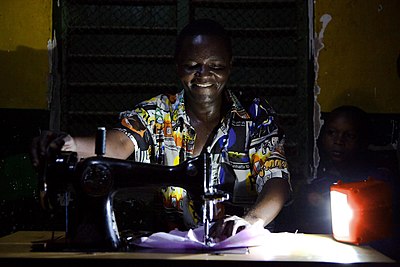Click here to register!
Difference between revisions of "Making Markets Work – Models for Private Sector Engagement in Humanitarian Energy"
***** (***** | *****) (Created page with " ") |
***** (***** | *****) m |
||
| Line 1: | Line 1: | ||
| + | {| style="width: 100%" class="FCK__ShowTableBorders" cellspacing="1" cellpadding="1" border="0" | ||
| + | |- | ||
| + | | style="width: 85%; border-bottom: 4px solid rgb(255, 206, 0); vertical-align: bottom; text-align: left" | | ||
| + | <p style="text-align: center"> | ||
| + | '''<span style="color:#000000"><span style="font-size: 25px"> Making Markets Work | Models for Private Sector Engagement in Humanitarian Energy</span></span>'''</p> | ||
| + | |} | ||
| + | <choose> | ||
| + | <option>[[File:Impact through energy innovation (18771476659).jpg|400px|link=]]</option> | ||
| + | <option>[[File:Dalberg image 1.jpg|400px|right|link=]]</option> | ||
| + | <option>[[File:Dalberg Image 3.jpg|400px|right|link=]]</option> | ||
| + | </choose> | ||
| + | Worldwide, there are around 3 million displaced households living in camps, most of them living more than four years in such settlements. 80% of them have no or only a little access to energy for lighting and cooking. They rely on torches, kerosene candles and inefficient traditional stoves or three-stone fires for cooking. To cover their energy needs they spend an average of 170 USD per year. This 1.6 billion USD market is expected to grow. At the same time, there is momentum in the humanitarian sector to create a more enabling environment for private sector collaboration. | ||
| + | |||
| + | So the question is: | ||
| + | How can the private sector be stronger engaged in humanitarian energy markets? What are the lessons learnt so far, and which market models exist? | ||
| + | |||
| + | GPA, GOGLA, Shell, Dalberg, Mercy Corps and IFC warmly invite you to a dialogue series on public-private partnerships in humanitarian energy. In three panel sessions, a wide range of experts will share their knowledge, expertise, and learnings. Register now! | ||
| + | |||
| + | |||
| + | |||
| + | = Organizers = | ||
| + | |||
| + | [[File:Logos webinar.png|600px|alt=Logos webinar.png]]<br/> | ||
| + | |||
| + | <br/> | ||
| + | |||
| + | <br/>__NOTITLE__ __NOAUTHORLIST__ __NOEDITSECTION__ | ||
Revision as of 06:26, 19 April 2021
|
Making Markets Work | Models for Private Sector Engagement in Humanitarian Energy |

Worldwide, there are around 3 million displaced households living in camps, most of them living more than four years in such settlements. 80% of them have no or only a little access to energy for lighting and cooking. They rely on torches, kerosene candles and inefficient traditional stoves or three-stone fires for cooking. To cover their energy needs they spend an average of 170 USD per year. This 1.6 billion USD market is expected to grow. At the same time, there is momentum in the humanitarian sector to create a more enabling environment for private sector collaboration.
So the question is: How can the private sector be stronger engaged in humanitarian energy markets? What are the lessons learnt so far, and which market models exist?
GPA, GOGLA, Shell, Dalberg, Mercy Corps and IFC warmly invite you to a dialogue series on public-private partnerships in humanitarian energy. In three panel sessions, a wide range of experts will share their knowledge, expertise, and learnings. Register now!
Organizers




















